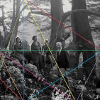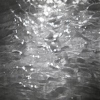 These two very different releases are the first formal full-length albums from Michael Jantz's solo guitar project, but he already has a lengthy discography behind him that spans many of cassette culture's most revered labels (Stunned, Housecraft, Digitalis, etc.).  While he covers a wide stylistic range, Jantz never seems like a tourist: he brings an assurance and a laconic charm to everything from banjo playing to neo-krautock.  In fact, he might be one of the only artists that I can think of that can seamlessly bridge the gulf between the rootsy steel string folks and the newer wave of loop-y, laptop-enhanced experimentalists.  He is not infallible though.
These two very different releases are the first formal full-length albums from Michael Jantz's solo guitar project, but he already has a lengthy discography behind him that spans many of cassette culture's most revered labels (Stunned, Housecraft, Digitalis, etc.).  While he covers a wide stylistic range, Jantz never seems like a tourist: he brings an assurance and a laconic charm to everything from banjo playing to neo-krautock.  In fact, he might be one of the only artists that I can think of that can seamlessly bridge the gulf between the rootsy steel string folks and the newer wave of loop-y, laptop-enhanced experimentalists.  He is not infallible though.
I had heard at least one Black Eagle Child tape (Poland?) prior to Lobelia's release this spring and I liked it, despite the fact that it hadn't left a particularly large impression on me. A lot of people seemed very enthusiastic about this project, so I figured I had probably just picked up one of Jantz's lesser releases–I maintained high expectations for Lobelia.  In one way, it succeeds admirably: Micheal’s rustic and lazily ambling banjo and guitar instrumentals sound far too accomplished and melodic to be emerging from the cassette underground.  There are several pieces that easily could be mistaken for subtly experimental '60s or '70s major label folk (there are nature recordings in the mix, as well as a gurgling child). That isn't a dig: Jantz is a skilled guitarist and there is lot to admire here.  Michael keeps things enjoyably airy, spacious, and organic throughout and knows how to craft strong melodies and tight, intelligently arranged songs.  Also, I enjoyed the bittersweet, sitting-on-a-porch-swing-in-the-dying-days-of-summer feel of pieces like the opening "Crandon."
Unfortunately, the problem with making such a pastoral and pleasantly melodic album is that it winds up sounding almost indistinguishable from a lot of other able guitarists making nice music.  Lobelia lacks character.  It also lacks bite–this is simply too polite and weightless for someone as maladjusted as I am.  That said, there are a couple of excellent departures, such as the woozy, melancholy shimmer of "I Forgot" and the muted burbling of "A Different River."  Jantz, at his best, is extremely talented and wrangles an unexpected amount of emotion out of his guitar.  On Lobelia, unfortunately, he is not always at his best: he seems quite content to play it very straight about ¾ of the time.  That is not a very high success rate, I'm afraid.  I'd classify this album as a handful of excellent songs regrettably embedded in a pleasant and inoffensive misfire.
Samples:

Although Pages On A Plane followed Lobelia by just a few months, Jantz overtly sounds like a completely different artist.  For example, there is nothing that sounds particularly folk-influenced nor is there any banjo or field recording present (though his daughter makes another brief appearance).  In a deeper sense, however, Michael is very much himself (only perhaps more so).  These five songs are characteristically unhurried, sun-dappled, and melodically strong.  And they're great.  All of them.  Naturally, part of this album's success is simply due to intelligent self-editing and sequencing: Pages On A Plane clocks in around a rather lean half-hour, but there is no wasted time.  Also, Jantz seems to have made a savvy leap forward in both his composition and studio techniques, as he deftly uses tricks like repetition, delay, and layering to give pieces like "I Am A Bunny" pulse and depth.  His use of processing is particularly effective near the end of "Long Reflector," where digitally mangled notes seem to fall to the ground and decay like leaves.
Those ravaged notes might be the only element of the album that could be construed as "bite" or "grit," but Pages On A Plane unexpectedly offers something even better (and significantly more rare): a palpable sense of playfulness and wide-eyed wonder.  The most successful example of this is the beautifully snowballing lattice of ringing arpeggios in the aforementioned "I Am A Bunny," but I am also quite partial to "Cycle To The Moon," which sounds like vibrant, loose-limbed, and fun detournement of a Neu! song.  The first two songs ("The Lost Button" and "Spring") didn't hit me quite as hard as the rest of the album, but they are still both pretty unimpeachable in a shimmering, ambient way.  I can't complain–Pages On A Plane is a flawless, oft-amazing effort.  I now understand why Jantz is held in such high regard, as he seems singularly able to tap into something pure and innocent when he is at the top of his game.
Samples:
 
 
Read More

